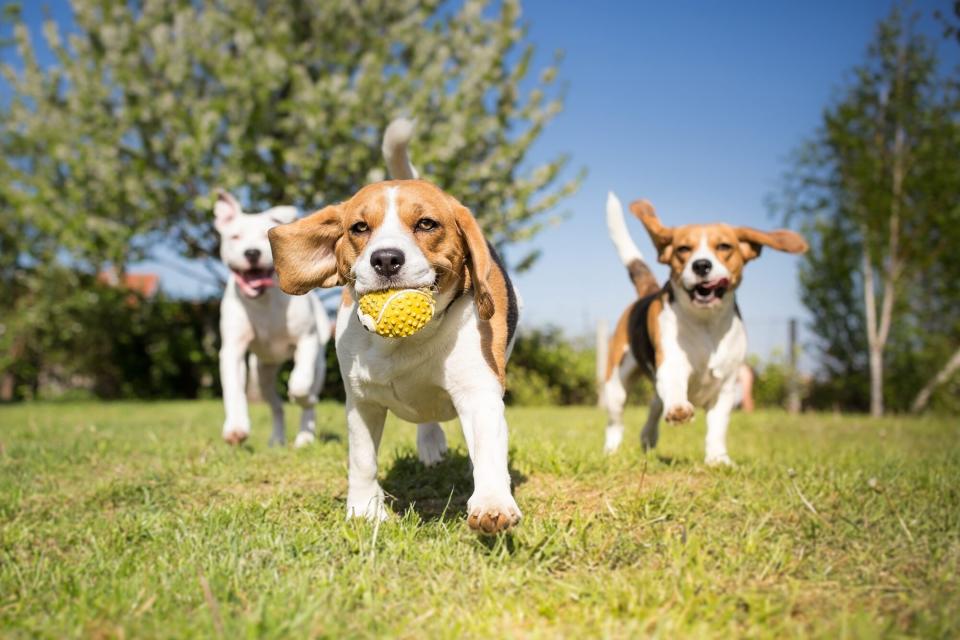Is It Safe to Take My Dog to the Dog Park?
Good pet parents take their dogs to off-leash dog parks, right? Not always, Natalie Marks, DVM, co-founder of Top Vets Talk Pets and veterinarian at VCA Blum Animal Hospital in Chicago, says. "Not every dog can go to the dog park and feel comfortable in that setting," she explains. "For some pups, the dog park can be a scary place. And taking a fearful pooch to the dog park can be downright dangerous."
Abiding by all the dos and don'ts of off-leash dog parks helps. But if your dog tends to be anxious or dog-reactive, a trip to the dog park likely won't be fun for your pup. Find out how to tell when it's best to avoid the dog park, and fun activities you can do together instead.
Signs You Should Avoid Dog Parks
Dogs that are already fearful or anxious at home are at a high risk of getting into a squabble at the dog park, Marks says. Skip going if your dog displays any of these fear- or anxiety-driven behaviors at home:
Yawns a lot
Paces
Pants
Startles easy
Possessive of toys and food bowl
Protective of you
Doesn't play well with other dogs
How your dog responds to other dogs while walking on a leash is also a good indicator of how well he'll do at an off-leash dog park. If your pup starts to growl, excessively bark, or makes slow, deliberate movements when another dog approaches, it's a sign that he feels uncomfortable or even threatened. Does your dog act hesitant on walks? He's probably feeling nervous. In either case, your dog is showing signs of stress and probably won't do well at a dog park.
RELATED: Why Does My Dog Bark at Other Dogs?

Lunja / Getty
Dog Park Alternatives
Don't feel bad if trips to the dog park aren't in your future, Marks says. "There are many dogs out there that do great without it. They enjoy one-on-one interaction with you or doing other activities in a more controlled setting."
Some dogs may just not want to run around with other dogs. Take, for instance, greyhounds who are master couch potatoes most of the time but might enjoy chasing small critters (including other dogs) when off leash. And toy breeds, who get easily overwhelmed around big dogs, may react defensively when they feel cornered. Even border collies who typically have a lot of energy to burn won't get as much from the dog park as they would from doing agility training or nosework (finding scents), which provides a lot of mental stimulation. Every individual dog is different with their own personality, so breed aside, your pup may just prefer doing activities with you in other environments.
Besides walking and playing fetch or tug-of-war, there are plenty of other things you can do to bond with your furry pal. You can train, practice, and compete in dog sports like fly ball, Frisbee championships, dock diving, and carting.
Or if you and your dog are the outdoorsy type with an active lifestyle, there are plenty of outdoor activities you can do together for exercise like hiking, running, yoga, biking, kayaking, or even surfing.
"A lot of small breed dogs (and dogs of any size or breed) make wonderful therapy dogs, too," Marks says. "You and your dog can go into hospitals and nursing homes to lift others' spirits together."
When Your Pack Is Divided
What if there's only one dog in your household who isn't keen on dog parks? It's perfectly fine for that pup to stay at home while the rest of your pack visits the dog park, says Marks. "Leave your dog with a puzzle toy and let him be in a safe zone while your other dogs do a different activity. It doesn't say anything negative about you as a pet parent. In fact, it shows how clued-in you are to your dogs' different personalities and needs."
The bottom line: Adding a dog to your family should be a thing of joy. If going to the dog park makes you or your pooch nervous, scrap it and find a different way to have fun together.

